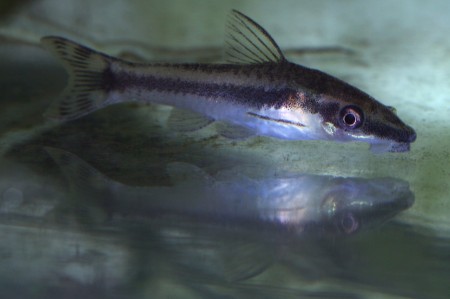Senegal’s Fisheries Minister Challenges Foreign Factory Ships on Overfishing
Healthy Choice MPCS on April 14, 2014 in Economy, Fisheries, Food Security, Policy | Comments Off
Local fishermen in some West African countries cite smaller catches because of overfishing by factory trawlers.
Senegal’s Minister of Fisheries and Maritime Affairs isn’t afraid to confront foreign fishing fleets when it comes to safeguarding his country’s fish resources. Minister Haidar El Ali has in recent years canceled the fishing licenses of dozens of foreign trawlers whose illegal fishing activities threaten his nation’s food security. Huge ships hailing from several nations including Russia, Ukraine, Spain and South Korea employ massive ships in Senegal’s waters to trawl small pelagic fish (fish that swim near the surface of the water) that is ground into animal feed. “Small pelagics are a food staple in the Sahel region. In a single day those ships can trawl what an artisanal crew takes in a year,” El Ali explained. The minister has threatened fines in the range of hundreds of thousands of euros to combat what he sees as an onslaught on his nation’s seafood supply, yet the commercial activities continue. In one of his more aggressive actions, El Ali famously seized the 120-metre Russian trawler, the Oleg Naydenov, which had been carrying 1,000 metric tons of fish. He brought the ship ashore, holding it for several days as the fish sat and rot. There are other foreign factory ships operating in the country’s water, some able to haul 3,000 metric tons of fish at a time, valued at $100,000. As these trawlers can go out 10 times in a day, it is no wonder local fishermen have sounded an alarm on foreign overfishing which effects the catch of the locals.
The small pelagics El Ali is so adamant about protecting are an important food resource across the entire west African coastal region from Sierra Leone to Morrocco. Due to a combination of governmental mismanagement, corruption, heavily subsidized EU fishing fleets and a sovereign nation status for countries like Mauritania, West Africa’s waters are a most attractive option for illegal commercial fishing/ illegal, unreported and unregulated fishing, known as IUU. While threatening the food supply, economy and income source of an estimated 2 million workers who are reliant on the sea for their livelihood in Senegal, IUU has some challenges in the works. El Ali is working on drafting new fisheries policy to impose stiffer penalties for illegal commercial fishing and environmental advocacy groups are shining a brighter light on Africa’s marine industry. El Ali is hoping to not just fine law breakers, but legally seize their ships.
By Faye Nwafor
